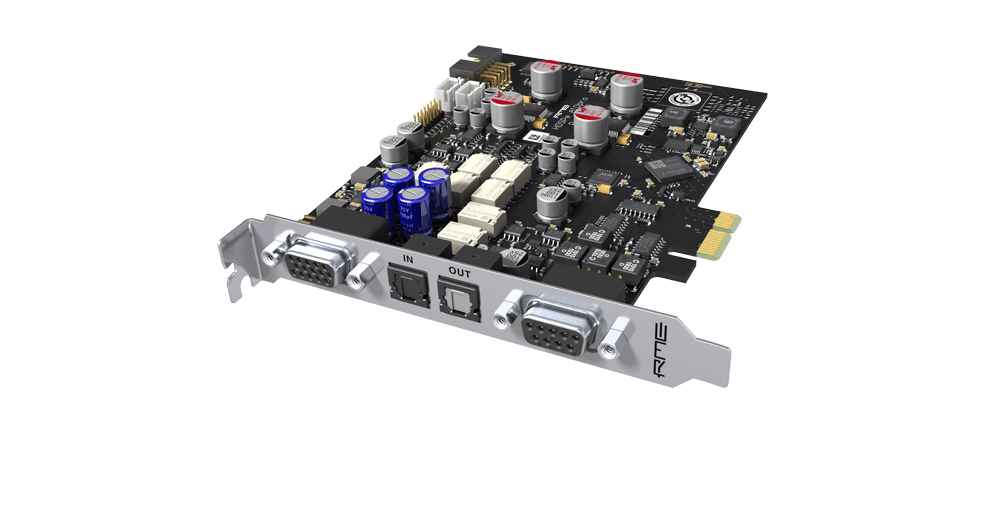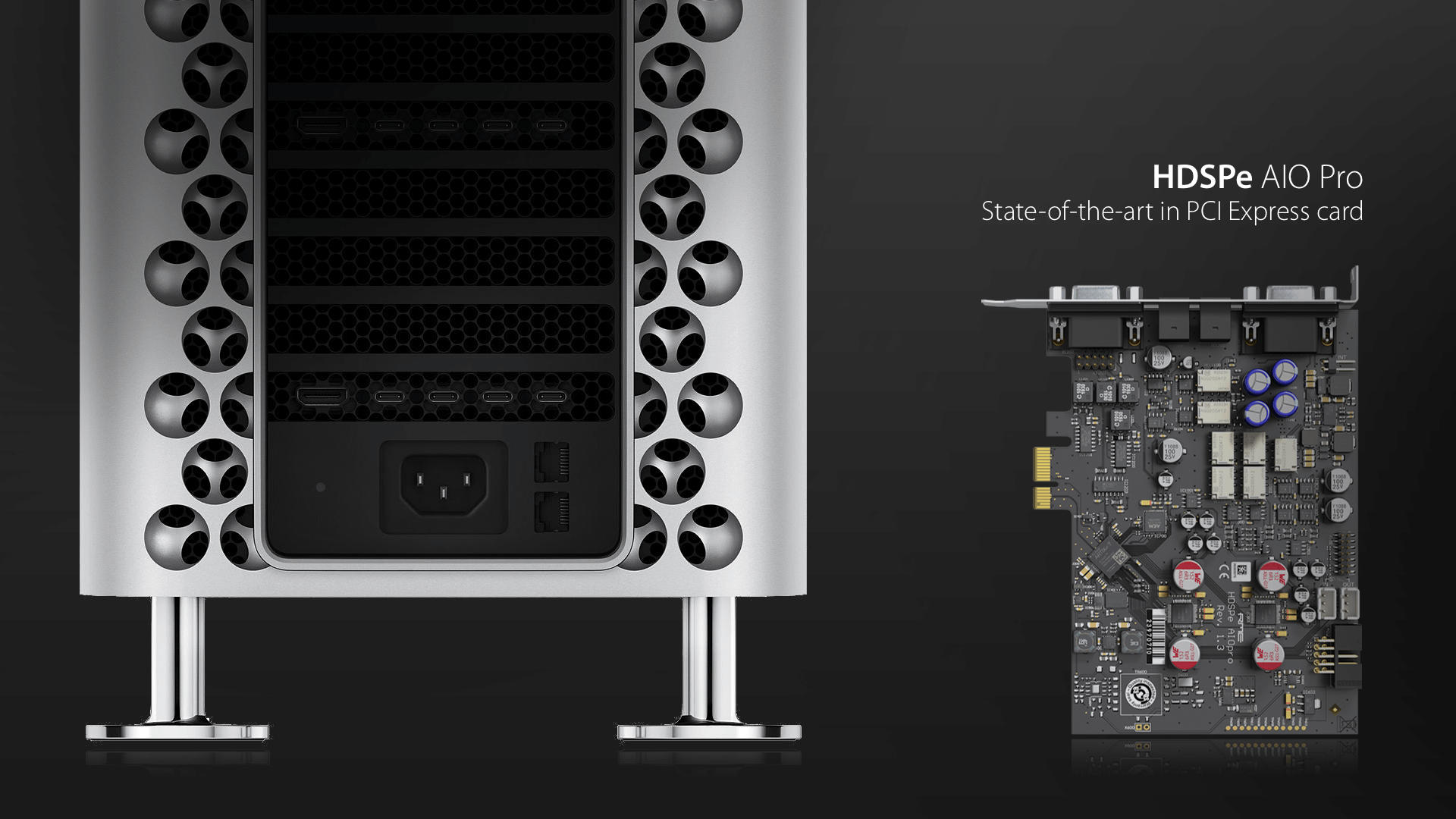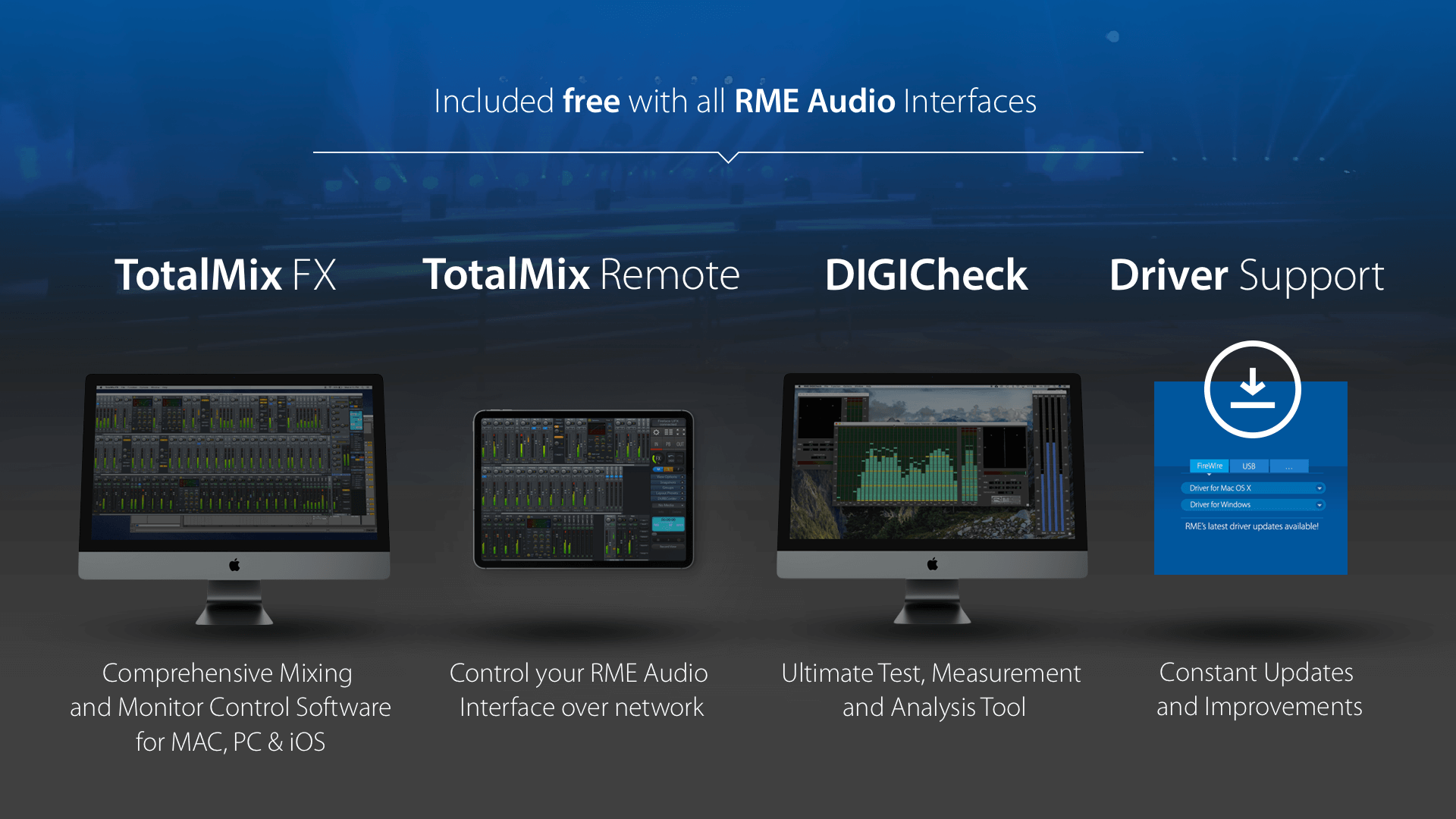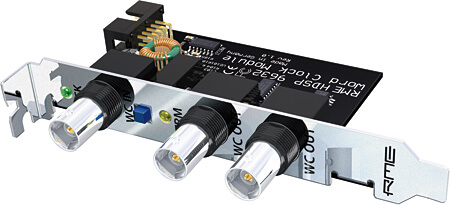HDSPe AIO Pro
30-Channel PCI Express Card with Multi-Format I/O


Connectivity and Features
All inputs and outputs are simultaneously operational, even SPDIF (phono) and AES/EBU (XLR). Of course TotalMix, the unsurpassed flexible routing mixer and SteadyClock FS, RME's sensational clock technology with maximum jitter suppression of external clock signals, are on board too. HDSPe AIO Pro also supports the optional TCO for synchronization to timecode (LTC/video).
The new HDSPe AIO Pro is based on the reference processors AK5572 and AK4490 derived from the high-end AD/DA converter ADI-2 Pro. The analog input range also uses the circuit design of the ADI-2 Pro (+24 / +19 / +13 / +4 dBu). In addition, RME has enhanced the outputs with additional reference levels (balanced: +24 / +19 / +13 / +4 dBu; unbalanced: +19 / +13 / +4 / -2 dBu) which allows even more versatile integration into audio systems. The HDSPe AIO Pro features a dedicated attenuator in the output section, resulting in an increased signal-to-noise ratio and a lower output impedance at low reference levels.
A further highlight of the HDSPe AIO Pro is the newly developed, powerful and extremely transparent headphone output. Thanks to mute relay including switchable output levels, there is no unwanted crackling noise at the headphone output and the analog XLR and RCA outputs when switching on the computer.

HDSPe AIO Pro -The completely reworked successor of the popular HDSPe AIO.
The HDSPe AIO Pro provides unique features:
- Balanced* stereo analog in- and output, 24-bit/192kHz
- All analog I/Os capable of 192 kHz, constant number of available channels
- 1 ADAT digital I/O, supporting 192 kHz via S/MUX4 operation
- 1 SPDIF digital I/O, 192 kHz-capable
- 1 AES/EBU digital I/O, 192 kHz-capable
- 1 High Power Headphone Output, separate DA-converter and playback device
- 1 MIDI I/O with 16 channels of hi-speed MIDI via breakout cable
- DIGICheck, RME's unique metering- and analysing tool
- TotalMix FX: 760 channel Mixer with 42 bit internal resolution
- Native PCI Express - no PCI to PCI Express bridge used
- Outputs with Mute Relais
- +24 dBu I/O Levels
* The HDSPe AIO Pro ships in a basic version with analog RCA/phono breakout cables (headphone: TRS jack). Therefore all analog I/Os are unbalanced. An analog XLR breakout cable is available as option (headphone: Neutrik TRS locking jack), turning analog into balanced mode.

TotalMix FX - Mixing/Routing with superior features for Studio and Live Work
Since 2001 TotalMix added unlimited routing and mixing to RME‘s audio interfaces. Its unique capability to create as many independent submixes as output channels available turned it into the most flexible and powerful mixer of its kind.
SteadyClock FS - Reference class Digital Clocking
Excellent performance in all clock modes and High Quality Analog Conversion to hear your mix as it is, with lowest jitter and highest jitter immunity.
DigiCheck - The Secret Weapon of High Resolution Audio Measurements
RME Audio interfaces not only provide you with a professional digital audio interface, but also with a free available software tool: DigiCheck, for metering, testing, measuring and analyzing digital audio streams.
Accessories
- HDSPe AIO/AIO Pro: Analog breakout cable, balanced (BO9632XLRMKH)
- HDSPe AIO Pro: Analog breakout cable, unbalanced (BO9632CMKHPro)
- HDSPe AIO/AIO Pro: Digital breakout cable, SPDIF (BO9632)
- HDSPe AIO/AIO Pro: Digital breakout cable, AES/EBU & SPDIF (BO968)
Word Clock Module (WCM)
The Word Clock Module (WCM) provides a galvanically isolated word clock input and two word clock outputs (BNC connectors). Both outputs have their own driver stages, providing an extremely low jitter signal. A push switch activates 75 Ohms termination for the hi-impedance input. SteadyClock, part of the PCI card, guarantees an excellent performance in all clock modes. Its highly efficient jitter suppression refreshes and cleans up any clock signal, and provides it as reference clock at the two outputs.
Installation is done in a convenient manner using the supplied bracket. No PCI slot on the motherboard is required. The module is internally connected via a 10-pin connector and a flat ribbon cable to the PCI card. Thanks to several LEDs (power, termination, LOCK) and the highly integrated concept of installation, first operation and usage are simple even for the inexperienced user.
More information can be found in the HDSP 9632 WCM manual.
Specs
HDSPe AIO Pro
Analog Inputs
RCA (Standard D-Sub Breakout cable)
- Input: Cinch (RCA), unbalanced
- Input impedance: 18 kOhm
- Input sensitivity switchable +24 dBu, +19 dBu, +13 dBu, +4 dBu @ 0 dBFS
- Signal to Noise ratio (SNR) @ +19/24 dBu: 117 dB RMS unweighted, 120 dBA
- Signal to Noise ratio (SNR) @ +13 dBu: 116 dB RMSu nweighted, 118 dBA
- Signal to Noise ratio (SNR) @ +4 dBu: 112 dB RMSu nweighted, 114 dBA
- Frequency response @ 44,1 kHz, -0,1 dB: 7 Hz – 20.5 kHz
- Frequency response @ 96 kHz, -0,5 dB: 3 Hz – 45,5 kHz
- Frequency response @ 192 kHz, -1 dB: 2 Hz – 92 kHz
- THD @ -1 dBFS: -114 dB, 0,0002 %
- THD+N @ -1 dBFS: -110 dB, 0,0003 %
- Channel separation: > 110 dB
XLR (optional D-Sub Breakout cable)
as RCA, except:
- Input: XLR, servo-balanced
- Input impedance balanced: 36 kOhm, unbalanced: 18 kOhm
- Signal to Noise ratio(SNR) @ +4 dBu: 116 dB RMS unweighted, 118 dBA
Analog Outputs
RCA (Standard D-Sub Breakout cable)
- Output: Cinch (RCA), unbalanced
- Output impedance+19/+13 dBu: 75 Ohm. +4/-2 dBu: 80 Ohm
- Output impedance switchable +19, +13 dBu, +4 dBu, -2 dBu @ 0 dBFS
- Signal to Noise ratio (SNR) @ +19 dBu: 117 dB RMS unweighted, 119 dBA
- Signal to Noise ratio (SNR) @ +13 dBu: 116 dB RMS unweighted, 118 dBA
- Signal to Noise ratio (SNR) @ +4 dBu: 114 dB RMS unweighted, 116 dBA
- Signal to Noise ratio (SNR) @ -2 dBu: 110 dB RMS unweighted, 112 dBA
- Frequency response @ 44.1 kHz, -0,1 dB: 10 Hz – 20,2 kHz
- Frequency response @ 96 kHz, -0,5 dB: 4 Hz – 44,6 kHz
- Frequency response @ 192 kHz, -1 dB: 3 Hz – 83 kHz
- THD @ 0 dBFS: < -107 dB, 0,0005 %
- THD+N @ 0 dBFS: -105 dB, 0,0006 %
- Channel separation: > 110 dB
XLR (optionales D-Sub Breakout cable)
as RCA, except:
- Output: XLR
- Output impedance +24/+19 dBu: 150 Ohm, +13/+4 dBu: 160 Ohm
- Output level switchable +24 dBu, +19 dBu, +13 dBu, +4 dBu @ 0 dBFS
- Signal to Noise ratio (SNR) @ +24 dBu: 117 dB RMS unweighted, 120 dBA
Phones
as RCA, except:
- Output: 6.3 mm TRS jack, unbalanced, stereo
- Output impedance: 0.1 Ohm
- Signal to Noise ratio (SNR) @ +19 dBu (Hi-Power): 117 dB RMS unweighted, 119 dBA
- Signal to Noise ratio (SNR) @ +7 dBu (Lo-Power): 113 dB RMS unweighted, 115 dBA
- Output level at 0 dBFS, Hi-Power, load 150 Ohm or up: +19 dBu (6.9 V)
- Output level at 0 dBFS, Lo-Power, load 16 Ohm or up: +7 dBu (1.73 V)
- THD+N @ + 15 dBu, 32 Ohm load, 590 mW: -97 dB, 0.0016 %
- Max power @ 0.1% THD 32 Ohm: 730 mW per channel
Digital Inputs
AES/EBU
- 1 x XLR, transformer-balanced, galvanically isolated, according to AES3-1992
- High-sensitivity input stage (< 0,3 Vss)
- SPDIF compatible (IEC 60958)
- Accepts Consumer and Professional format, copy protection will be ignored
- Lock Range: 28 kHz – 200 kHz
SPDIF
- 1 x RCA, transformer-balanced, according to IEC 60958
- High-sensitivity input stage (< 0,3 Vss)
- AES/EBU compatible (AES3-1992)
- Accepts Consumer and Professional format, copy protection will be ignored
- Lock Range: 28 kHz – 200 kHz
ADAT Optical
- 1 x TOSLINK, format according to Alesis specification
- Standard: 8 channels 24 bit, up to 48 kHz
- Double Speed (S/MUX): 4 channels 24 bit 96 kHz
- Quad Speed (S/MUX4): 2 channels 24 bit 192 kHz
- Bitclock PLL ensures perfect synchronisation even in varispeed operation
- Lock range: 31.5 kHz – 50 kHz
Digital Outputs
AES/EBU
- 1 x XLR, transformer-balanced, galvanically isolated, according to AES3-1992
- Output level 4,0 Vss
- Format Professional according to AES3-1992 Amendment 4
- Single Wire mode, sample rate 28 kHz up to 200 kHz
SPDIF
- 1 x RCA, transformer-balanced, according to IEC 60958
- Output level Professional 2.3 Vpp, Consumer 1.0 Vpp
- Format Professional according to AES3-1992 Amendment 4
- Format Consumer SPDIF according to IEC 60958
- Single Wire mode, sample rate 28 kHz up to 200 kHz
ADAT
- 1 x TOSLINK, format according to Alesis specification
- Standard: 8 channels 24 bit, up to 48 kHz
- Double Speed (S/MUX): 4 channels 24 bit 96 kHz
- Quad Speed (S/MUX4): 2 channels 24 bit 192 kHz
Digital
- Clocks: Intern, ADAT In, SPDIF In, Sync In, optional Word clock In / LTC in
- Jitter suppression of external clocks: > 50 dB (2,4 kHz)
- Effective clock jitter influence on AD and DA conversion: near zero
- PLL ensures zero dropout, even at more than 100 ns jitter
- Digital Bitclock PLL for trouble-free varispeed ADAT operation
- Supported sample rates: 28 kHz up to 200 kHz
MIDI
- 1 x MIDI I/O via 5-pin DIN jacks
- Galvanically isolated by optocoupled input
- Hi-speed mode: Jitter and response time typically below 1 ms
- Separate 128 byte FIFOs for input and output
All specifications are subject to change without notice.
Drivers
HDSPe AIO Pro
Updates HDSPe MADI to firmware version 33/210, HDSPe PCI and HDSPe ExpressCard to 20, RayDAT to 18/207, AES to 11/204, MADIface to 23, AIO to 14, AIO Pro to 23/108.
Now also includes the DriverKit firmware versions:
HDSPe MADI to firmware version 35/216, HDSPe PCI and HDSPe ExpressCard to 21, RayDAT to 20/210, AES to 13/207, MADIface to 24, AIO to 201, AIO Pro to 26/110.
Updates HDSPe MADI card to firmware version 33/210, HDSPe PCI and HDSPe ExpressCard card to 20, RayDAT to 18/207, AES to 11/204, MADIface to 23, AIO to 14, AIO Pro to 23. Windows XP SP2 / 7 / 8 / 10 / 11. Supports all HDSPe cards/systems! Now also includes DriverKit compatible firmware versions.
Version 4.25, for macOS 11 and up. Supports Intel and Mx. See readme for installation notes.
Updates HDSPe MADI to firmware version 33/210, HDSPe PCI and HDSPe ExpressCard to 20, RayDAT to 18/207, AES to 11/204, MADIface to 23, AIO to 14, AIO Pro to 23/108.
Now also includes the DriverKit firmware versions:
HDSPe MADI to firmware version 35/216, HDSPe PCI and HDSPe ExpressCard to 21, RayDAT to 20/210, AES to 13/207, MADIface to 24, AIO to 201, AIO Pro to 26/110.
Supports 10.9 up to 10.15. See readme.txt for important notes! Version 4.17. Also supports HDSPe PCI Card and ExpressCard with Digiface, Multiface and RPM.
Mac OS X SL (10.6) Intel driver for HDSPe series (MADI, AES, RayDAT, AIO, MADIface, Multiface, Digiface, RPM). Supports 10.5 in 32 bit, 10.6 in 32 bit and 64 bit. See readme.txt for important notes!
Version 2.67. Supports DIGICheck. See readme.txt for important notes!
Updates HDSPe MADI card to firmware version 33/210, HDSPe PCI and HDSPe ExpressCard card to 20, RayDAT to 18/207, AES to 11/204, MADIface to 23, AIO to 14, AIO Pro to 23. Windows XP SP2 / 7 / 8 / 10 / 11. Supports all HDSPe cards/systems! Now also includes DriverKit compatible firmware versions.
WDM, WDM-KS and ASIO. Version 4.50. Windows XP SP3 / 8/10/11, not Windows 7. Supports all HDSP and HDSPe cards/systems except HDSPe MADI FX.
WDM, WDM-KS and ASIO. Version 4.50. Windows XP SP3 / 8/10/11, not Windows 7. Supports all HDSP and HDSPe cards/systems except HDSPe MADI FX.
Updates HDSPe MADI card to firmware version 33/210, HDSPe PCI and HDSPe ExpressCard card to 20, RayDAT to 18/207, AES to 11/204, MADIface to 23, AIO to 14, AIO Pro to 23. Windows XP SP2 / 7 / 8 / 10 / 11. Supports all HDSPe cards/systems! Now also includes DriverKit compatible firmware versions.
WDM, WDM-KS and ASIO. Version 4.36. Windows XP SP3 / 7/8/10. Supports all HDSP and HDSPe cards/systems except HDSPe MADI FX.
WDM, WDM-KS and ASIO. Version 4.50. Windows XP SP3 / 8/10/11, not Windows 7. Supports all HDSP and HDSPe cards/systems except HDSPe MADI FX.
WDM, WDM-KS and ASIO. Version 4.50. Windows XP SP3 / 8/10/11, not Windows 7. Supports all HDSP and HDSPe cards/systems except HDSPe MADI FX.
WDM, WDM-KS and ASIO. Version 4.36. Windows XP SP3 / 7/8/10. Supports all HDSP and HDSPe cards/systems except HDSPe MADI FX.
TotalMix FX V 1.98 (2). This zip includes only TotalMix FX, to update TotalMix when using older drivers that come with an older TotalMix FX version.
Installation: Exit TotalMix FX completely and copy the app into the Applications folder, overwriting the old file.
TotalMix Remote V 1.43 - App to remote control TotalMix FX via ethernet and WiFi from other devices with Mac OS 10.12 or up. Universal Binary, supports Intel and Mx. Please note: can not be run on the same computer where the host TotalMix FX is used. This download is not TotalMix FX, which is part of the driver installation.
TotalMix FX V 1.98 for Windows, 32 bit version. This zip includes only TotalMix FX, to update TotalMix when using older drivers that come with an older TotalMix FX version.
Installation: Exit TotalMix FX (right click systray icon) and copy the new version into Windows\System32, overwriting the old file.
TotalMix Remote V 1.43 - Program to remote control TotalMix FX via ethernet and WiFi from other devices with Windows OS (PC, Tablet). Please note: can not be run on the same computer where the host TotalMix FX is used. This download is not TotalMix FX, which is part of the driver installation.
TotalMix FX V 1.98 for Windows x64.. This zip includes only TotalMix FX, to update TotalMix when using older drivers that come with an older TotalMix FX version.
Installation: Exit TotalMix FX (right click systray icon) and copy the new version into C:\Prgram Files\RME\Fireface or \MADIface, overwriting the old file. If there is no such directory then you need to use the TotalMix FX 32 bit file.
TotalMix FX V 1.98 for Windows Arm 64 bit. This zip includes only TotalMix FX, to update TotalMix when using older drivers that come with an older TotalMix FX version.
Installation: Exit TotalMix FX (right click systray icon) and copy the new version into C:\Prgram Files\RME\Fireface or \MADIface, overwriting the old file.
TotalMix FX V 1.98 for Windows x64.. This zip includes only TotalMix FX, to update TotalMix when using older drivers that come with an older TotalMix FX version.
Installation: Exit TotalMix FX (right click systray icon) and copy the new version into C:\Prgram Files\RME\Fireface or \MADIface, overwriting the old file. If there is no such directory then you need to use the TotalMix FX 32 bit file.
Universal binary, runs natively on Intel and Mx machines. DigiCheck NG V 0.92 requires macOS 10.13 (High Sierra) or up.
Differences to v 4.53: EBU R-128 Meter. Surround Audio Scope with ITU weighting. Simultaneous usage of multiple cards in all functions. Displays fully configurable (e.g. channel selection). Multichannel Level Meter freely configurable. MMCSS for Vista. Many improvements on surface and internal operation. Supports all current interfaces plus DIGI 9636/52. DIGI32 series and DIGI96 series are no longer supported. (10/05/2020).
V596 adds compatibilty for HDSPe MADI FX and XT with DK firmware.
DigiCheck NG V 0.92 requires a Direct3D 12 capable graphics card and Windows 10 or up.
DigiCheck NG V 0.92 requires a Direct3D 12 capable graphics card and Windows 10 or up.
Manuals
HDSPe AIO Pro
Manual for HDSPe AIO Pro
version 1.0, 10/2020
